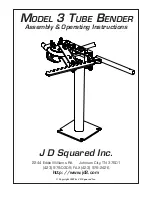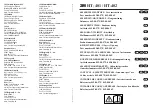
Cosasco
®
RBS/RBSA Retriever Maintenance Work Instruction
P/N: 741031revH
Scheduled Review Date: July 2018
Page:
9 of 46
Date: 26/06/2017
Note: Please ensure you have the latest revision of this document by downloading it from our website or by contacting Cosasco Customer Service.
The maintenance interval required by either the RBSA or RBS retriever will vary depending
upon the service to which it is subjected. Certain fluids will wash out all lubricant from the
retriever after one retrieval; others will deposit debris in the retriever making operation difficult.
If the retriever has been in use and it is anticipated not being used again for a period longer
than one day, it should be completely disassembled, cleaned and lubricated. Also, if in a days
operation (because of adverse retrieval environment conditions) the retriever becomes difficult
to operate, feels gritty and does not stroke or turn easily, it should first be cleaned and
lubricated without disassembly as indicated in Part 5.2 below. If cleaning and lubricating
without disassembly does not relieve the difficulties in the retriever operation, it should be
completely disassembled, cleaned and lubricated as indicated in either Part 5.3 or 5.4 of this
Section.
Lubricant choices are many. For a particular service, some experimentation may be
necessary. Recommended lubricants are:
1. Motor Oil - (SAE 30 weight or equivalent).
2. Lubriplate (multi-purpose) - A lithium base grease; usually the best choice for
most service since it is thin and applies easily. Use for service temperatures of
0° to +350°F (-18° to +177°C). Available as Cosasco 129372.
3. Synthetic lubricant - A molybdenum disulfide grease containing rust and oxidation
inhibitors. It is recommended for use in extreme pressures and temperatures (-40°
to +600°F, -40° to +316°C). Available as Cosasco 201688.
5.1
Sour Gas Service
On both the RBS and RBSA retrievers, applicable materials comply with the requirements of
NACE standard MR0175, "Sulfide Stress Cracking Resistant Metallic Materials for Oil Field
Equipment." As stated in this standard. "Materials ... are resistant to, but not necessarily
immune to (sulfide stress cracking) under all service conditions." Thus, when the retriever is
used in sour environments, it must be thoroughly cleaned after use to help prevent corrosion
and/or damage to internal materials.
5.2
Cleaning and Lubricating Without Disassembly
1. Extend the retriever until the socket adapter is withdrawn into the inner barrel by
approximately 1/2 inch. Place the retriever head end down on a clean surface.
2. Add solvent. Pour approximately one pint (1/2 liter) of solvent into the retriever
inner barrel.
3. Collapse the retriever slowly.
Pilot
Summary of Contents for RBS
Page 45: ...NOTES ...










































